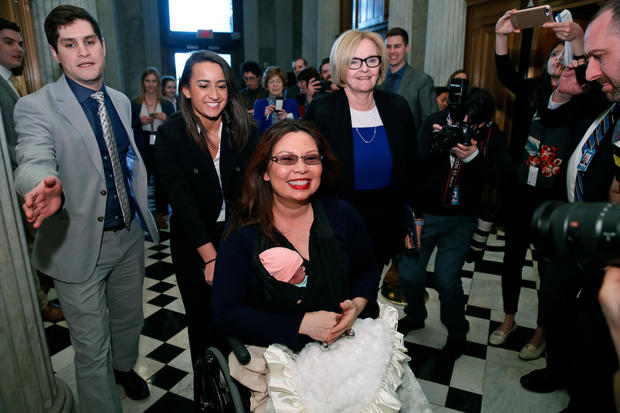"I absolutely see a sea change": How moms in politics are changing the game
When Liuba Gretchen Shirley was considering a Democratic congressional bid against New York's longtime Republican Rep. Peter King, her greatest hesitation was how to care for her two young children. Her husband worked full time, and she worked as a consultant, but from home, where she was able to watch after them.
She decided to go for it, hiring a part-time nanny to help. As the campaign ramped up, she needed more help -- and it cost too much.
But for Liuba -- and, she hopes, for other mothers, fathers and families who aren't wealthy -- that barrier was eased Thursday, when the Federal Election Commission unanimously approved her request to allow campaign funds to be used for campaign-related childcare expenses. Federal election law prohibits campaign funds from being expended for personal use, but allows for campaign funds to be used for campaign-related expenses that would not otherwise be needed. The FEC decided this expense qualifies. Gretchen Shirley was anticipating a barrage of questions and debate at the FEC meeting, but what she heard instead was support, with FEC commissioner Ellen Weintraub predicting the decision will change the dynamic of Washington, allowing people who aren't independently wealthy to run for public office.
"It's incredible," Gretchen Shirley said in an interview. "I don't think it's sunk in yet, to be honest. It's a game changer."
The Long Island candidate's cause gained particular attention when former Secretary of State and presidential hopeful Hillary Clinton backed her request in a letter to the FEC.
The New York candidate said she hopes the ruling will inspire more women, and more parents, to run for office.
"There's a reason that so many of our congressional representatives are millionaires," Gretchen Shirley said. "It's a way to break down barriers so that we have a more representative democracy."
Gretchen Shirley said she wants to see more people in Washington who know what it's like not to have access to paid family leave, and be able to afford medical care -- "Those are the types of voices that we're missing in Washington."
The landmark FEC decision in Gretchen Shirley's favor comes just a few weeks after the Senate unanimously voted to change its rules to allow Sen. Tammy Duckworth, D-Illinois, to bring her 10-day-old daughter onto the Senate floor.
"It's about time," Duckworth told reporters that day.
Gretchen Shirley called that an "inspiring" moment -- one she hopes and thinks there will be more of as more women run for office.
"I absolutely see a sea change," Gretchen Shirley said, about the public's attitude towards women in office, and the changes that come along with that, opening up.
Gretchen Shirley said she's seen campaign ads where women are nursing, as one example. It's the "fact that they're not shying away from their motherhood" that is significant, she said.
The 2018 midterm elections are proving to yield more women candidates than any other election cycle.
But there is more to be done.
Mothers in the public eye, she said, have to answer to so many more questions than fathers do about work-life balance. When her son broke his leg last month, an event that collided with her campaign schedule, Gretchen Shirley said she was accused of being a bad mom.
"It's incredible what women will get, and what men won't," she said.
"Men don't have to respond to that," she said. "I have never heard of a male candidate being asked, 'what do you do with your children if you win?' And I get asked that regularly."






